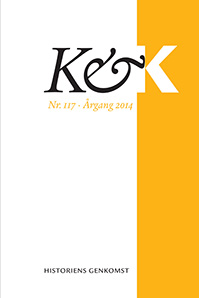DEN KOSMOPOLITISKE HUMANISME OG RACISMEN - CLAUDE LÉVI-STRAUSS SOM EKSEMPEL
DOI:
https://doi.org/10.7146/kok.v42i117.17570Nøgleord:
humanism, cosmopolitanism, anthropology, travel literature, cultural relativism, racism, Claude Lévi-Strauss, Tristes tropiques, “Race et culture”Resumé
COSMOPOLITAN HUMANISM AND RACISM. CLAUDE LÉVI-STRAUSS AN EXAMPLE | In this article I discuss how cosmopolitan humanism, understood as the celebration and protection of cultural diversity which emerged in the field of the humanities, social sciences and politics after World War II, is related to modern racism. The point of departure of the discussion is an analysis of Claude Lévi-Strauss’ descriptions of his travels in the former British India in the 1950’s in his famous travelogue Tristes tropiques (1955). On the one hand Lévi-Strauss is considered a central figure in the fight against racism in the wake of World War II. He has written several widely influential texts in which he deconstructs old evolutionist myths and substitutes the notion of different races with the notion of different cultures. In addition, he has argued forcefully for the equality of all cultures and the benefits of intercultural exchange. But on the other hand he has also advocated cultural segregation. An example of this is his description of the Indian caste system not as a racist institution but as an ideal attempt to avoid racial conflicts by separating the different ethnic groups altogether. In my article I argue that this contradiction is not just due to an inconsistency in Lévi-Strauss’ texts but rather the result of an inherent ambivalence in cosmopolitan humanism as such and in the cultural relativism on which it is based.
Downloads
Citation/Eksport
Nummer
Sektion
Licens
Tidsskriftet følger dansk ophavsret.





